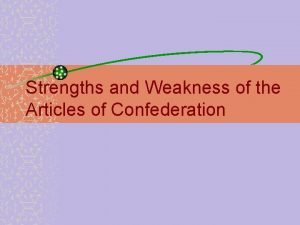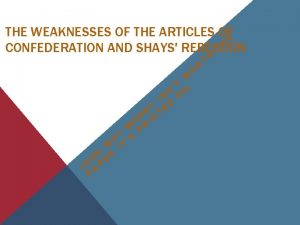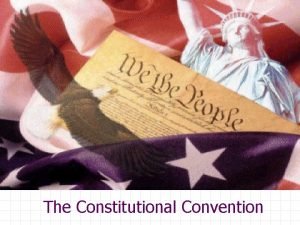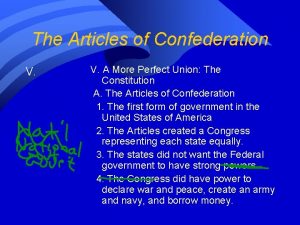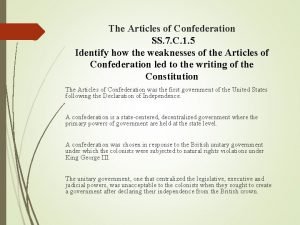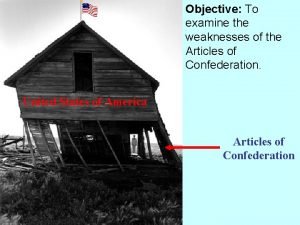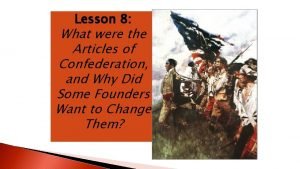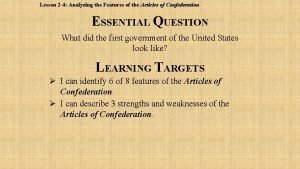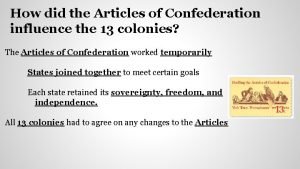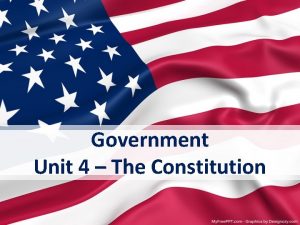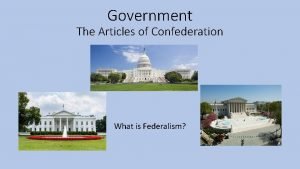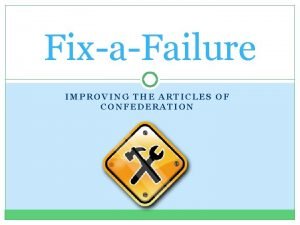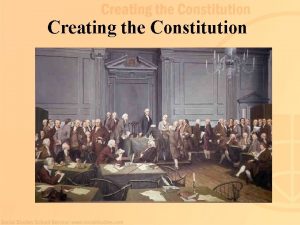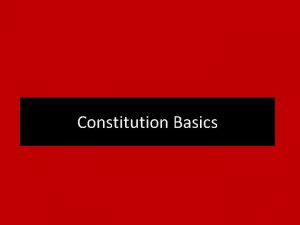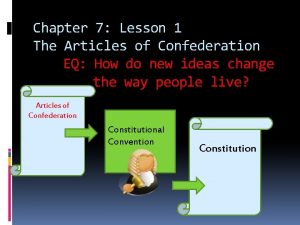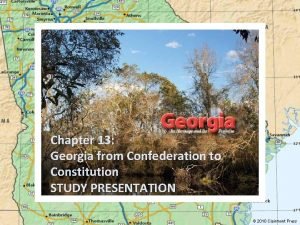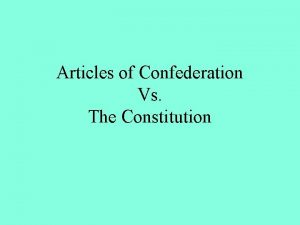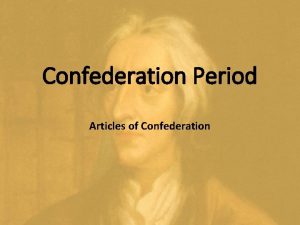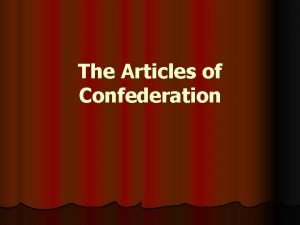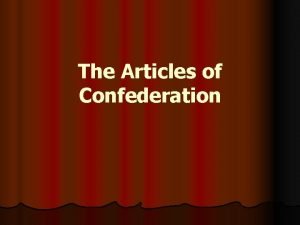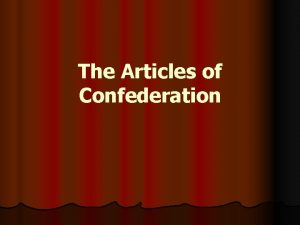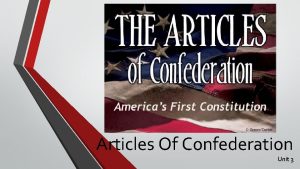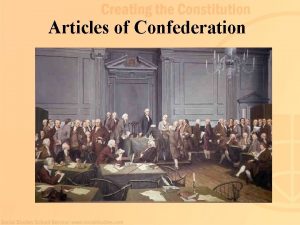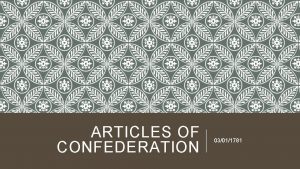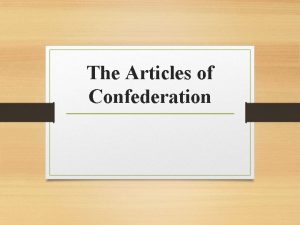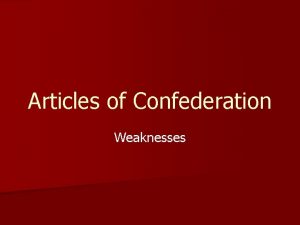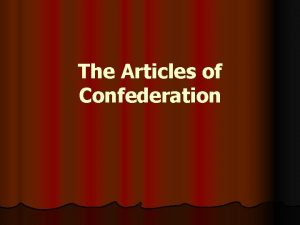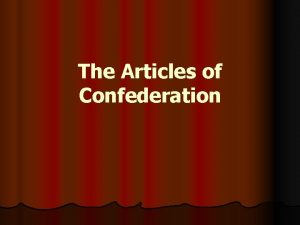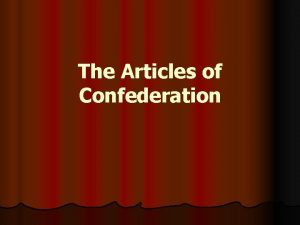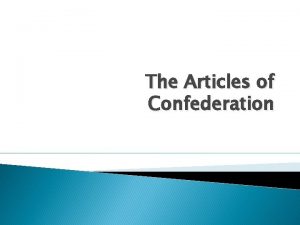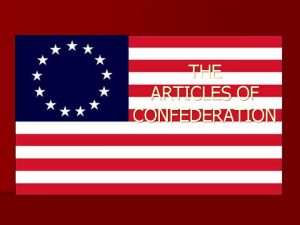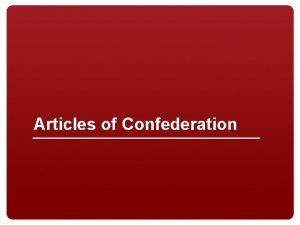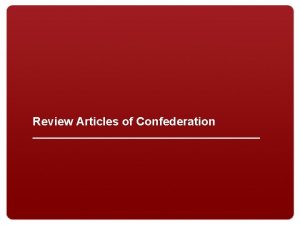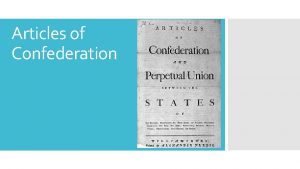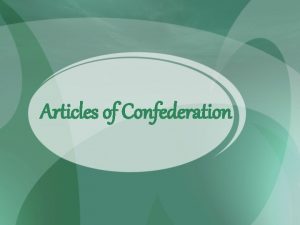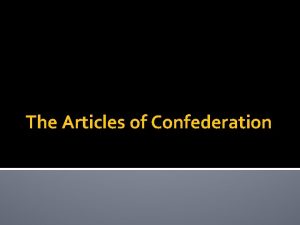5 1 Articles of Confederation and Compromise Standards




















- Slides: 20

5. 1 Articles of Confederation and Compromise • Standards • 8. 2. 2 Analyze the Articles of Confederation and the Constitution and the success of each in implementing the ideals of the Declaration of the Independence. • 8. 2. 4 Describe the political philosophy underpinning the Constitution as specified in the Federalist Papers (authored by James Madison, Alexander Hamilton, and John Jay) and the role of such leaders as Madison, George Washington, Roger Sherman, Gouverneur Morris, and James Wilson in the writing and ratification of the Constitution. • 8. 3. 1 Analyze the principles and concepts codified in state constitution between 1777 and 1781 that created the context out of which American political institutions and ideas developed.

• 8. 3. 2 Explain how the ordinances of 1785 and 1787 privatized national resources and transferred federally owned lands into private holdings, townships, and states. • 8. 3. 5 Know the significance of domestic resistance movement and ways in which the central government responded to such movement (e. g. , Shay’s Rebellion, the Whiskey Rebellion). • 8. 9. 3 Describe the significance of the Northwest Ordinance in education and in the banning of slavery in the new states north of the Ohio River.

Essential Questions 1. What were some of the weaknesses of the Articles of Confederation? 2. What was the “Great Compromise” and what did it do? 3. How did the issue of slavery shape the Constitution?

Quick Write “Pick a classroom or school rule/policy you would like to change. Explain why you believe this rule/policy should be changed. Do you think a lot of students will agree with you? Write your new or amended rule. Remember the rule can’t disappear, only be changed. ”

Ch 5. 1 Experimenting with Confederation MAIN IDEA Americans adopted the Articles of Confederation but find the new government too weak to solve the nation’s problems.

WHY IT MATTERS NOW The weakness of the Articles of Confederation led to the writing of the Constitution.

Colonies to States • Self-governing -allegiance to their colony. -continues when they become states.

State Constitutions • Constitution= a document stating the rules under which a government will operate. • Limits the power of leaders. • Guarantee specific rights; stress liberty, not equality. -Only white males can vote; sometimes have to own property.

Protecting Rights • Virginia Bill of Rights -Protected freedoms/individual rights -Religion -Press -Limits on Arrest -Limits searches -Trial by Jury -No cruel or unusual punishments

Democracy vs. Republic • Democracy gives too much power to uneducated. • Republicanism- Citizens rule through elected representatives; consent of people. -John Dickson: put the nation’s good above self. -John Smith: pursue own interests.

Representation • Population. -Size of pop. = Amount of votes in Congress. • State. -Each gets a vote regardless of size.

Early Republics • None balanced needs of the state and national gov. • Ancient Greece, Rome, & Italian city -states all failed.

Confederation • Alliance: national government, states share powers.

Articles of Confederation, 1777 • Alliance between the thirteen colonies -Help win the war and create treaty • Placed limits on government to prevent abuses of power -No executive branch (No President) -No national court (No Supreme Court) -No central government or national unity, separate states -Each state had one vote, regardless of pop.

Limited Central Government • Congress couldn’t enact or collect taxes, states only -Had to borrow money from the states. • Articles could be amended only if all states approve them -Nine out of thirteen states could pass important laws -Couldn’t enforce the laws it passed.

Western Lands • States had to give claims to western territories. • Land Ordinance of 1785 -Creates plan for surveying and selling western lands. -Set up townships -Sections for schools

Northwest Ordinance of 1787 • Plan for creating territories and statehood. -Set up basic rights. -Banned slavery. -Set up basic government. -pop. 60, 000 could apply for statehood.

National Problems • Lack of unity. • Economic depression • Huge war debt. -Domestic and foreign. • Creditors favor high taxes. -Farmers lose land livestock. • Currency, more or less?

Foreign Relations Problems • Don’t pay debts to British merchants. -British won’t leave forts on Great Lakes. • 1784, Spain close Mississippi river. -Westerners can’t ship crops east. • Congress unable to resolve problems.

Shay’s Rebellion • Proved weakness of A. o. Confederation. • 1786 -1787, Daniel Shay organizes farmers. -Farmers are losing farms. • G. Washington calls for a stronger national government.
 3 weaknesses of the articles of confederation
3 weaknesses of the articles of confederation Strengths and weakness of the articles of confederation
Strengths and weakness of the articles of confederation Political weaknesses of the articles of confederation
Political weaknesses of the articles of confederation Achievements of the articles of confederation
Achievements of the articles of confederation Problems with articles of confederation
Problems with articles of confederation Articles of confederation strengths
Articles of confederation strengths When was the great compromise
When was the great compromise Strengths of the articles of confederation
Strengths of the articles of confederation Weaknesses of the articles of confederation
Weaknesses of the articles of confederation Failures of the articles of confederation
Failures of the articles of confederation Confederation
Confederation Strengths of the articles of confederation
Strengths of the articles of confederation Why did the articles of confederation fail
Why did the articles of confederation fail Articles of confederation vs constitution
Articles of confederation vs constitution Articles of confederation
Articles of confederation How did the constitution fix the articles of confederation
How did the constitution fix the articles of confederation Federalism in the constitution
Federalism in the constitution Weaknesses of the articles of confederation
Weaknesses of the articles of confederation Chapter 7 lesson 1 the articles of confederation
Chapter 7 lesson 1 the articles of confederation Articles of confederation vs constitution
Articles of confederation vs constitution Constitution vs articles of confederation
Constitution vs articles of confederation

